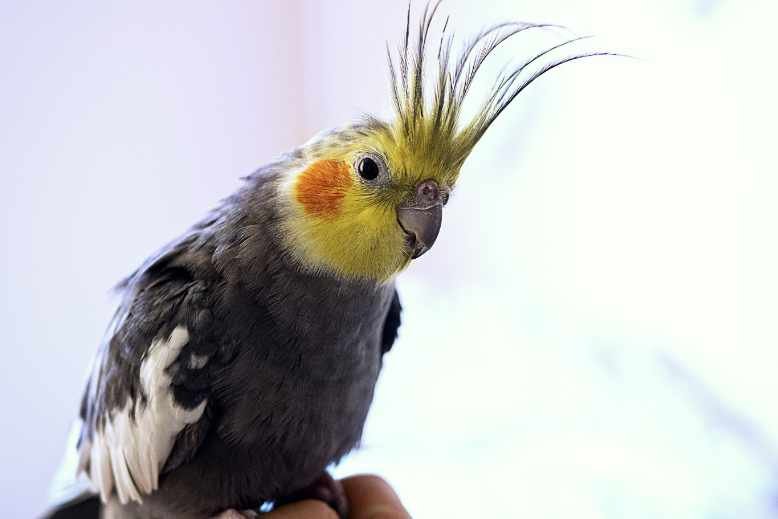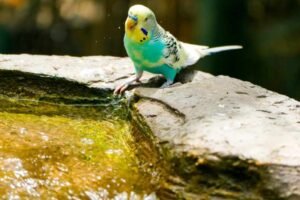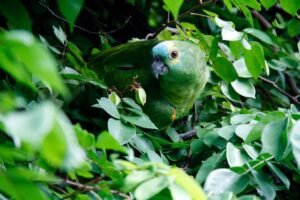My cockatiel flew away, will it come back? You might NOT have lost your special friend, and the little fellow is likely to come back to you soon. If your actions are quick enough, the chances of getting an accidentally lost cockatiel back are high.
Having a bird as a pet is a wonderful experience. You can have so much fun with these little fellows. But with all the fun, there are some concerns as well. And one of the most unwanted accidents that happen with cockatiels is that these birds tend to fly away, leaving you with the problem of finding a lost cockatiel.
Cockatiel escape is really common, and it happens too quickly. These birds can fly away if you accidentally leave their enclosure open. One unseen, open window or a half-open door and your bird is on its way to outside.
For some bird lovers losing a cockatiel brings so much sadness, loss of energy, and guilt. Their attachment makes them think about the moment their bird went out of their sight. But don’t worry. Finding a lost Cockatiel is hard but never impossible. Here are some of the most effective tips that you can follow to get your bird back.
Without further ado, let’s get started!
Cockatiel flew away; how to get it back?
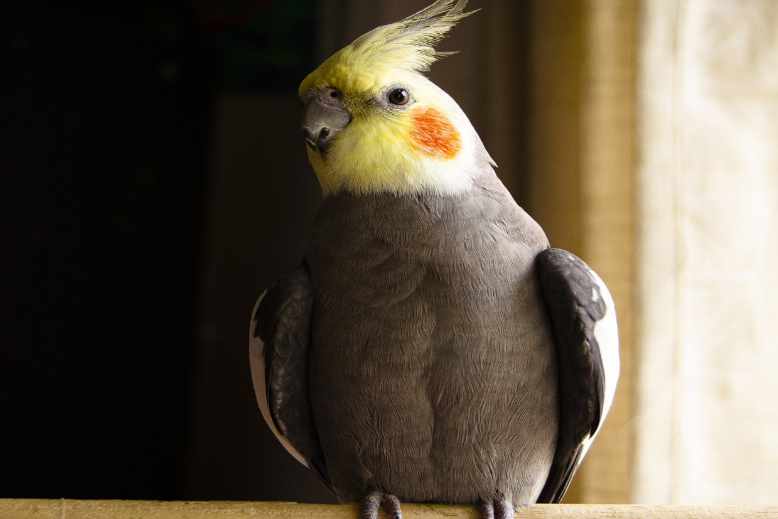
Sadly, cockatiels that intentionally fly away can be a little hard to find. This strong flier can travel long miles without realizing it. And with the excitement of freedom, cockatiels quickly lose their sense of direction. These birds can fly 30 miles a day, which is something to think about. Plus, there are a lot of predators. Even if your cockatiel tries to return home, it may not be able to do so.
So, what can you do to get your escaped birdie back? Well, losing a cockatiel is a nightmare, but it’s not the end of it. The story can have a happy ending. There are some things that you can do to get your cockatiel back. But make sure you follow the tips as soon as you realize your bird is out of its cage.
Take Immediate Action
Most cockatiels are unable to track their way back. Plus, they don’t have traits to fight out predictors. So, the very moment you find out your cockatiel is gone, start searching immediately. The faster you look for your lovely bird, the better it is.
Immediate response is critical when you are dealing with a cockatiel fly away situation. The best chances of recovery ask you to take action when you discover your pet bird is missing. Call in everyone quickly and start looking.
Scan all the nearby poles, perches, and trees on your surrounding properties. Examine each perch from 360° angles as bright-colored birds can hide in branches.
Cockatiels cannot fly high. They tend to hide in one place to secure themselves from being prey to predators. So have a look at the trees first. The little bird may be nearby.
Imagine the scene from a bird’s eye view.
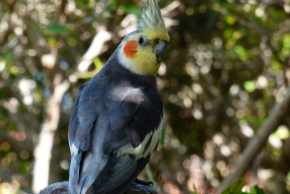
If you locate your bird in a tree, be sure to keep an eye on it. In some cases, birds are too afraid to move. Most birds that have been raised inside are unable to make a downward landing. Even if your cockatiel wants to, the flight from a tall tree to cage may seem like a tough nut to crack. You may need to calm the bird for some time so that the cockatiel can find enough nerve to flap down. Make sure you encourage the bird with familiar food and shelter.
Escaped Birds don’t pay attention to where they are flying. Try to realize that your cockatiel has never seen where you live from the air. The little fellow has no way of identifying your house.
Make sure the bird can recognize you from a distance. Wear bright-colored clothes, bring the familiar cage near the bird, and urge the bird to come closer. Call out your cockatiel in a soothing voice, talk the whole time, whistle, and use anything the bird can recognize you by.
Male cockatiel birds make a lot of noise thus are easier to locate. Females don’t make much noise, so you have to trust the visual clues.
Walk around the area.
If your actions are quick enough, there is a huge possibility that your cockatiel is still in the area. Say things you usually say to your cockatiel louder like, “pretty bird” or any other name. Scan the area and call your bird’s name repeatedly to get its attention. If the bird hears you, it will definitely make a sound.
You can also involve your neighbors in finding your cockatiel. Let them know about the escape. Your little birdie can possibly be in someone’s property or backyard. Having an extra pair of eyes from your neighbors can significantly increase the chances of getting a lost bird back.
Bring the cage near the bird.
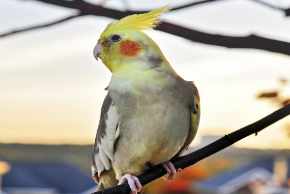
Bring the cage near to the cockatiel whenever possible. If your bird is on a tree, put the enclosure near the tree where the bird can see it. If the bird has escaped through the front door or window, place the cage near the window or doorstep. You can also hang it outside.
Load the cage with your pet’s favorite treats and toys. Don’t feel shy and spreading some tasty treats around the cage to lure the cockatiel back home. Use big visible pieces of food and leave the cage door open. We suggest using a quick-release trapdoor to lock the cage as soon as the bird enters.
The cockatiel might find its way back if it sees a familiar place. So, it’s better to leave the house open. Don’t shut the door and windows to help your bird reach back to you.
Use familiar sounds
Unable to lure a bird back with food and treats? Don’t lose hope!
If your cockatiel cannot track its way back, stay in the area and try calling the bird by its name. You can repeat any words, phrases, and sounds familiar to your bird to make it fly back to you.
If your bird is a music lover, play its favorite track outside. Make it easy for the little one to identify where the sound is coming from.
List your cockatiel as missing.
Traditional search mechanisms are great in finding a lost bird. And the process is pretty simple too. Just post missing posters, add your contact details, if possible, put a picture of your bird, and spread the banners all around your area.
You can request the spotters to report any sightings with the bird’s exact location. If you can offer a reward, we are sure your neighbors’ kids will love to help in the search. Finally, don’t forget to alert local bird clubs, lost and found centers, and veterinary offices.
Have a reward for the people helping you with the return of your bird
Sadly, if you don’t live in a friendly locality, your neighbors might not be interested in your bird at all. Although not always, a reward changes the situation completely. People tend to go the extra mile just because of the prize. Offering an award for a safe return is a great way to make people look for your missing birdie. It can be a temptation for people and help you get one step closer to your lost pet.
Post a missing update on the internet
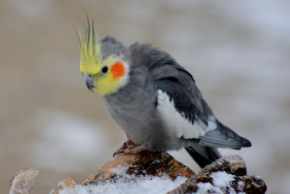
This move is not very different than telling your neighbors about the cockatiel escape. But it has the power of the internet. Your request for help can reach thousands of people in a matter of minutes.
With this, you can widen your search scope. More and more people can help you find your bird. People can immediately contact you and tell you whether they have seen your cockatiel or not.
Owners can post an ad in the local newspaper as well. It might help you find your pet faster. Plus, if some non-internet user is able to spot your bird, they can inform you at the right moment.
How far can a cockatiel fly?
If you are curious to know how far a cockatiel can fly, you might be surprised to see that speed is their best trait. Don’t take your cockatiel for granted, as they can reach a pace of 64 km/h. That’s a lot!
Luckily, cockatiels are fast flyers, but they cannot fly far away. If there is food and water, they are likely to stay in one place. Although a wild one can fly 30 miles a day, it is unlikely for a captive bird to reach that flight.
My cockatiel flew away, will it survive in the wild?
Cockatiels are capable of surviving in the wild. They are from the wild and can learn to survive on their own. But if you have a tamed bird, it will prefer settling in someone else’s house. Tamed ones depend on people and always try to look for a new owner.
If your pet is not tamed, it can survive in the wild.
Cockatiels are known to be friendly pets. They are energized and make great pets. These pets like to stay in one place as long as they have access to food and water. Depending on their preferences, some cockatiels travel from place to place, searching for food.
How long can an escaped cockatiel survive?
Cockatiels have a lifespan of 10 to 15 years. However, if your bird is used to living in a cage, it can be difficult for the fella to survive in the wild. Such birds thrive in captivity and are likely to struggle outside.
The fact is, we can never tell how long an escaped cockatiel can survive. Some escaped ones live a long life, while others aren’t so lucky.
If they find the resources of food and water, these birds will be just fine. They might be able to look for habitat and make their own family. If your bird is a lucky one, it can survive and be independent after the escape.
If a cockatiel flies away, will it come back?
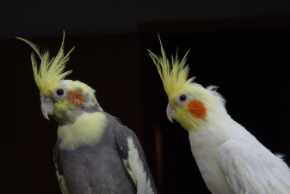
If a cockatiel flies away and you are late in your search, the chances of retrieval began to subside. These birds love flying and can be really fast and strong fliers.
With this speed, cockatiels can wander far away. They might not realize the distance and eventually lose track.
However, there is a possibility of finding a lost cockatiel back. These birds have a friendly temperament, and they create an attachment to their owner. So, they may come back seeking that companionship.
But first, you have to consider if the bird can find its way back.
How to prevent a cockatiel from flying away?
When a cockatiel flies away, it will be really challenging to get it back. It’s better to prevent this from happening than worrying about how to get your bird back later.
Here we have some tips on how to prevent a bird escape.
- Never provide your bird with the opportunity to fly away. Always lock the cage and keep your doors and windows closed.
- Always check all the exits before letting your cockatiel free.
- Always be careful when going outside with a bird. Keep in mind a bird’s brain is different from yours. No matter how attached it is, the fellow can fly away.
- Training is the best option to prevent a bird from flying away. Train your cockatiel to act on your commands.
- The simplest way to prevent your cockatiel from flying away is by clipping its wings. But make sure you keep your bird in a cage because cockatiels can still fly away with clipped wings.
- Record your cockatiel’s voice. Play the recorded voice again and again until the bird notices.
Wrapping Up
Whether you like it or not, birds have a tendency to fly away. Bird escape is a common concern for bird lovers. Although cockatiels might come back, mostly they don’t.
There are some prevention tips that you can follow to keep your bird from getting away. Use the available resources and start looking the moment you realize your cockatiel has escaped.
Act fast to ensure that the bird is not far away from your place.

